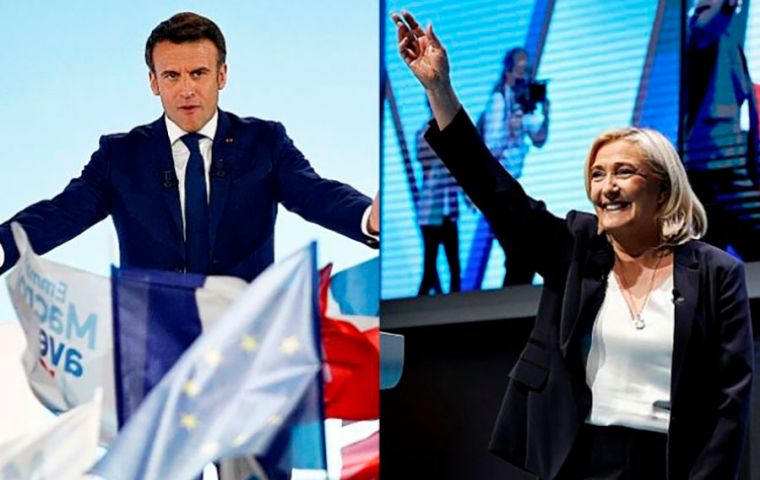MercoPress. South Atlantic News Agency
Macron, LePen set up rematch rendez-vous at France's presidential 2nd rd
 The two candidates are set to take part in a live TV debate on 20 April, four days ahead of the runoff
The two candidates are set to take part in a live TV debate on 20 April, four days ahead of the runoff Following Sunday's first round, France is looking ahead to a rematch of the presidential runoff from five years ago. The incumbent Emmanuel Macron, who won on that occasion and also came out first this weekend, will once again take on the far-right Marine Le Pen on April 24.
With Macron somehow worn out after 5 years in office, analysts foresee a much tighter fight this time around than in 2017.
With some polling stations still to be counted, Macron had received around 28.5% of the first-round votes while LePen took around 23%. As the top two finishers, they will progress to the second.
Despite entering the campaign late and holding just one rally, Macron performed slightly better than expected and won immediate support from most of his defeated rivals ahead of the run-off. “Make no mistake: nothing is decided,” Macron told his supporters. “The debate that we are going to have over the next fortnight will be decisive for our country and for Europe.”
“When the far-right in its various forms does so strongly in our country, you can't say that things are going well,” he added.
Far-left candidate Jean-Luc Melenchon came in the third, with a projected score of around 21 percent, while France's traditional parties (the Socialists and the Republicans) were on course for humiliating defeats and historic low scores.
One survey by the Ifop-Fiducial group suggested Macron had a razor-thin winning margin of 51% versus 49% at the runoff, but other polls showed Macron would win by 53% to 47%
Bidding to become France's first woman president, Le Pen increased her first-round score from 2017 and she is expected to pick up votes cast for her far-right rival Eric Zemmour, an anti-Islam newcomer who was projected to win around 7% of the votes Sunday.
Le Pen said the run-off would present “a fundamental choice between two visions” with Macron representing “division, injustice and disorder.” LePen has also said she would push for reforms within the European Union in case of victory. She has also said she wants to pull out of the joint military command of the US-led NATO military alliance.
On the other hand, Macron said he wanted “a France that places itself in a strong Europe, that continues to form alliances with the world's democracies to defend itself, not a France which, once out of Europe, would have only the international alliance of populists and xenophobes as allies. That's not us.”
The two candidates are set to take part in a live TV debate on 20 April.
Among the other candidates, Sunday's vote spelled humiliation for Paris Mayor Socialist Anne Hidalgo, the mayor of Paris, who was projected to win 1.8-2.0%, a historic low for the party which held the presidency just five years ago, while the right-wing Republicans, headed by nominee Valérie Pécresse, also collapsed to an estimated 4.3-5% from 20% in 2017. Greens candidate Yannick Jadot was also left disappointed with a projected score of under 5.0 percent.
(Source: RFI)




Top Comments
Disclaimer & comment rulesCommenting for this story is now closed.
If you have a Facebook account, become a fan and comment on our Facebook Page!